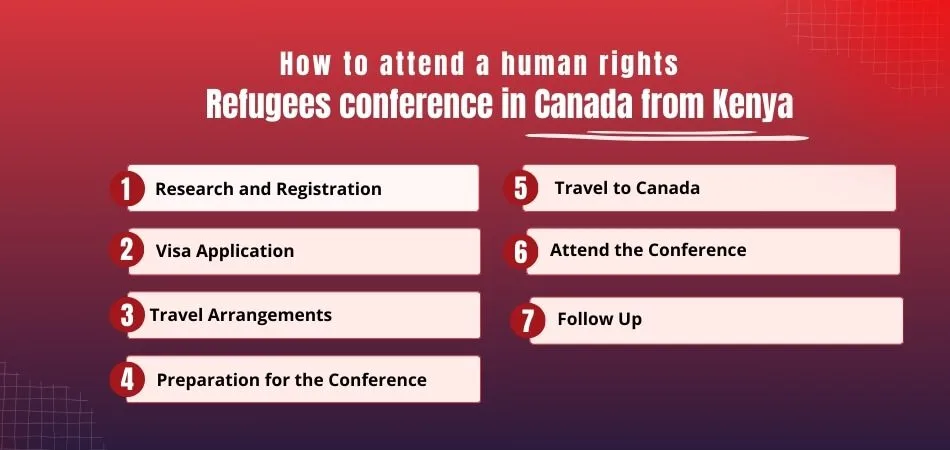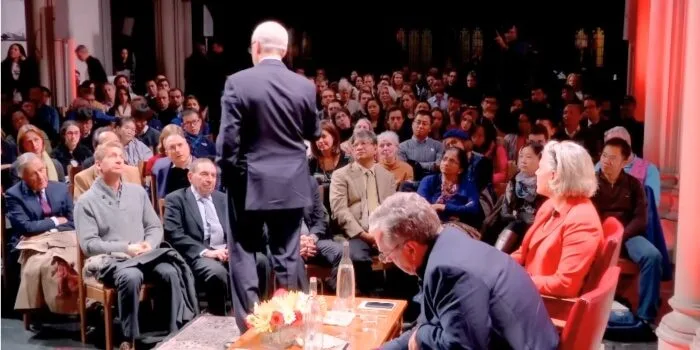Imagine being part of a global conversation on human rights and refugee issues that could change lives. Attending a conference in Canada offers invaluable insights and connections for passionate advocates from Kenya. But how to attend a Human Rights and Refugees Conference in Canada from Kenya? Let’s simplify this process!
Begin by ensuring you have a valid passport and start your visa application early. Research the specific requirements for the conference and gather necessary documents, including invitation letters and proof of funding. Proper planning is essential for a smooth experience.
Eager to learn more about handling this process? Continue reading to discover tips and resources that will help you make the most of your conference experience in Canada.
Human Rights and Refugees Conference: What Does It Mean?
A Human Rights and Refugees Conference serves as a vital platform for discussing critical issues affecting vulnerable populations worldwide. These conferences bring together policymakers, activists, scholars, and individuals with lived experiences to explore the complexities surrounding human rights and refugee crises.
At these gatherings, participants engage in dialogue on pressing topics such as the protection of refugees, the rights of marginalized communities, and the role of governments and NGOs in safeguarding these rights.
For those interested in attending, you can find Human Rights and Refugees Conference in Canada, which offers opportunities to connect with global experts and advocates. The aim is not only to raise awareness but also to foster collaboration among various stakeholders.
Workshops, panel discussions, and keynote speeches provide opportunities for attendees to share insights, best practices, and innovative solutions to challenges faced by refugees and displaced individuals. Additionally, these conferences highlight successful advocacy efforts, showcasing how grassroots movements can drive change on a global scale.
Ultimately, a Human Rights and Refugees Conference is more than just an event; it’s a call to action. It empowers participants to return to their communities with new knowledge, strengthened networks, and a renewed commitment to championing human rights for all, especially the most vulnerable among us.
How to Attend a Human Rights and Refugees Conference in Canada from Kenya?
Attending a Human Rights and Refugees Conference in Canada from Kenya can be an enriching experience, offering a chance to engage with global issues and connect with like-minded individuals.
If you’re wondering how to attend a human rights and refugees conference in Canada from Kenya, you’re in the right place. The journey involves several steps, from ensuring you have the necessary travel documents to making the most of the conference experience.
Let’s dive into the details and get you on your way to an unforgettable event.
Step 1: Research and Registration
Start your journey by researching conferences that resonate with your passion for human rights and refugee issues. Visit the event’s official website to explore the agenda, notable speakers, and the themes being discussed. This step ensures that you find a conference that truly aligns with your interests and goals.
Once you’ve identified a suitable event, don’t hesitate to register early. Securing your spot ahead of time not only guarantees your participation but may also save you money with early bird discounts. This proactive approach sets a positive tone for your entire conference experience.
Step 2: Visa Application
As a Kenyan citizen planning to attend a conference in Canada, securing a visa is an essential step. Start by visiting the website of the Canadian embassy in Kenya, where you’ll find detailed information about the visa application process. This is your go-to resource for understanding requirements specific to your situation.
Gathering the necessary documents, such as your valid passport, proof of conference registration, and financial statements, is crucial. Submitting your application well ahead of your travel dates ensures ample processing time, making your journey smoother and stress-free.
Step 3: Travel Arrangements
Once your visa is approved, it’s time to secure your travel arrangements. Start by booking your flights; comparing prices can help you find the best deals. Consider flying into the nearest airport to minimize travel time, which adds to your excitement for the conference.
Next, focus on accommodation. Staying near the conference venue is not just convenient but also allows you to immerse yourself fully in the event. Finally, arrange transportation from the airport to your hotel, whether it’s a shuttle, taxi, or rideshare, to ensure a smooth arrival.
 Step 4: Prepare for the Conference
Step 4: Prepare for the Conference
Preparing for the conference is crucial to making the most of your experience. Take time to review the agenda and choose sessions that resonate with your interests and goals. If you’re presenting, practice your delivery to feel confident and engaging. For those eager to learn, this is an excellent opportunity to attend Human Rights and Refugees Conference sessions that align with your passions.
Networking is equally important, so think about a concise introduction that highlights who you are and your work. This will help you connect with fellow attendees and foster meaningful conversations that could lead to valuable collaborations and insights.
Step 5: Travel to Canada
Before embarking on your journey to Canada, double-check that you have all your essential travel documents, including your passport, visa, and conference registration confirmation. These documents are crucial for a smooth entry into the country.
Arriving a few days early offers the perfect opportunity to adjust to the time zone and immerse yourself in your new surroundings. Take some time to explore the local culture, taste the cuisine, and connect with fellow attendees, making your conference experience even more enriching.
Step 6: Attend the Conference
Attending the conference is your chance to immerse yourself in meaningful conversations and learn from experts in the field. Make sure to participate actively in sessions and discussions, asking questions that spark dialogue and deepen your knowledge of key topics.
Networking is equally vital. Connect with fellow attendees, exchange contact information, and don’t hesitate to share your insights. Building these relationships can lead to future collaborations and support for your advocacy efforts. Enjoy the experience and make every moment count.
Step 7: Follow Up
Following up after the conference is crucial for nurturing the relationships you’ve built. Send personalized emails to your new contacts, expressing gratitude for their insights and the time spent together. A simple thank you can go a long way in establishing a relationship.
In your message, consider discussing any shared interests or ideas that emerged during your conversations. This can open doors for collaboration and help transform those initial connections into meaningful partnerships that further your advocacy work in human rights and refugee issues.
By following these steps, you’ll be well on your way to attending a Human Rights and Refugees Conference in Canada from Kenya, where you can contribute to important discussions and expand your professional network.
What Type of People Attend a Refugee and Human Rights Conference?
A Human Rights and Refugees Conference is a fusion of individuals and organizations dedicated to making a difference in the world. From seasoned activists to budding enthusiasts, the event welcomes a diverse crowd, all united by a common passion for human rights and refugee advocacy.
Here’s a closer look at who you might encounter at such a conference.
Human Rights Activists
These are passionate individuals who dedicate their lives to advocating for human rights. They come to learn, share experiences, and connect with like-minded people to strengthen their efforts in promoting justice and equality.
Refugee Advocates
These attendees work closely with refugee communities, providing support, legal aid, and raising awareness about the challenges refugees face. They seek to gain insights and collaborate on strategies to improve the lives of displaced individuals.
Policy Makers and Government Officials
Representatives from government bodies attend to understand the current issues and perspectives, which can inform and shape policies related to human rights and refugee protection.
Academics and Researchers
Scholars and experts in the field present their studies, engage in discussions, and contribute to the academic discourse on human rights and refugee issues.
Non-Governmental Organizations (NGOs)
NGOs play a crucial role in humanitarian efforts, and their representatives attend to network, share their projects, and learn about new initiatives and funding opportunities.
Media Representatives
Journalists and media professionals cover the event to report on the discussions and spread awareness about the topics addressed at the conference.
What are the Agendas of a Human Rights and Refugees Conference?
At a Human Rights and Refugees Conference, the agenda is packed with topics that matter. It’s all about addressing the pressing issues and finding ways to make a real impact. Here’s what you can expect.
Advocacy and Awareness
One key focus is raising awareness about human rights violations and the plight of refugees. The conference aims to highlight these issues and mobilize support for change.
Policy and Legal Frameworks
Discussions often revolve around the legal aspects, such as international laws and policies that protect human rights and refugees. The goal is to advocate for stronger legal protections and effective implementation.
Humanitarian Aid and Support
The agenda includes exploring ways to provide better support and aid to refugees, including healthcare, education, and resettlement programs.
Integration and Inclusion
A significant part of the conference is dedicated to finding solutions for the integration and inclusion of refugees into host communities, ensuring they have access to opportunities and a chance to rebuild their lives.
Collaboration and Partnership
The conference serves as a platform for building partnerships between different stakeholders, including governments, NGOs, and the private sector, to enhance cooperation in addressing human rights and refugee issues.
Can You Attend a Human Rights and Refugees Conference in Canada from Kenya?
Yes, attending a Human Rights and Refugees Conference in Canada from Kenya is definitely possible. With some planning and preparation, you can make your way to this impactful event, where your voice can contribute to global discussions on pressing issues.
Visa Requirements
Start by checking if you need a visa to enter Canada for the conference. If a visa is required, begin the application process early, as it can take time to gather the necessary documents and complete the application.
This may include an invitation letter from the conference organizers, proof of accommodation, and financial statements to demonstrate your ability to support yourself during your stay.
Conference Registration
Securing your spot at the conference is essential, so register in advance. Early registration often provides you with important information about the event, including schedules, keynote speakers, and session topics.
When you participate in Human Rights and Refugees Conference, this not only prepares you for the conference but also helps you plan your travel arrangements effectively.
Travel and Accommodation
Book your flights and accommodation as soon as possible to take advantage of the best deals. Consider the conference location when choosing where to stay, as proximity can save you time and transportation costs. Look for hotels or hostels that may offer special rates for conference attendees.
Budget Planning
Ensure you have budgeted for all expenses related to your trip, including travel, accommodation, conference fees, meals, and other incidentals. Planning your budget ahead of time will help you manage your finances and avoid surprises during your journey.
With careful planning and preparation, you can successfully handle the logistics and make the most of your time in Canada. Don’t miss this opportunity to connect with advocates and contribute to meaningful discussions on human rights and refugee issues.
Significance of Attending a Human Rights and Refugees Conference in Canada from Kenya
Attending a Human Rights and Refugees Conference in Canada from Kenya holds great significance for individuals passionate about making a difference.
It’s not just a trip; it’s an opportunity to be part of a global conversation. Here’s why it matters.
- Global Perspective: You gain insights into human rights and refugee issues from a global standpoint, understanding the challenges and solutions beyond the Kenyan context.
- Networking: The conference is a platform to connect with activists, experts, and organizations from around the world, opening doors for future collaborations and partnerships.
- Knowledge Sharing: It’s a chance to share your experiences and learn from others, contributing to a richer, more diverse dialogue.
- Skill Development: Workshops and sessions provide valuable skills and knowledge that you can apply in your work back in Kenya.
- Advocacy: By representing Kenya, you can highlight specific issues relevant to your country, bringing attention to them on an international stage.
As a result of attending such a conference, we can have a greater impact locally and globally on human rights and refugee support.
Frequently Asked Questions
Being able to attend a Human Rights and Refugees Conference in Canada from Kenya is an exciting opportunity, and you probably have some questions. Here are some FAQs to help you deal with the process.
Can I find financial support to attend the conference?
Yes, several organizations and foundations offer grants or scholarships for participants from developing countries. Research potential funding sources, and consider reaching out to local NGOs that focus on human rights or refugee issues for assistance.
What should I pack for the conference?
Pack comfortable clothing suitable for the weather in Canada, professional attire for networking, and any necessary materials such as notebooks or business cards. Don’t forget your travel documents, including your passport and visa.
Can I attend if I am not a human rights expert?
Yes, everyone is welcome at human rights conferences, regardless of their background. These events often encourage diverse perspectives, and your unique experiences and insights can contribute significantly to the discussions.
How can I prepare for the conference?
Research the agenda, speakers, and topics beforehand. Familiarizing yourself with key issues and formulating questions can improve your experience. Additionally, connect with other attendees online to discuss your shared interests before the event.
Is accommodation provided for conference attendees?
Typically, accommodation is not included in the conference registration fee. However, the conference website may provide recommendations for nearby hotels or hostels that offer special rates for attendees. Make your reservations early for the best options.
How can I make the most of my conference experience?
Engage actively in sessions, ask questions, and participate in discussions. Networking is crucial, so introduce yourself to fellow attendees and share your thoughts. Follow up with new connections afterward to nurture relationships and continue the conversation.
Final Words
As you prepare for this exciting journey, remember that attending a human rights and refugees conference in Canada is more than just an event; it’s a chance to amplify your voice and connect with like-minded individuals. Being aware of how to attend a Human Rights and Refugees Conference in Canada from Kenya can empower you to make a meaningful impact.
Managing the logistics may feel challenging, but with careful planning and a positive mindset, you can turn challenges into opportunities. From securing your visa to engaging in vibrant discussions, every step brings you closer to promoting change.
So, take a deep breath, embrace the experience, and know that your participation matters. Continue to advocate for human rights and refugees, and share your unique perspective at the conference.








